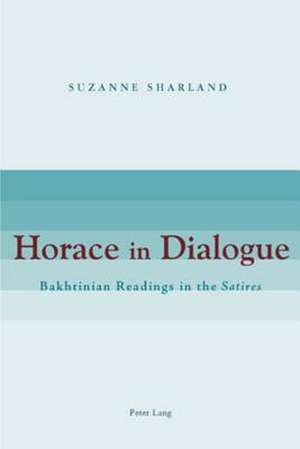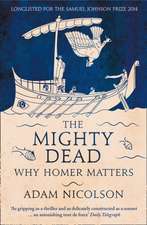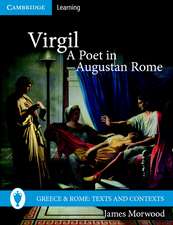Horace in Dialogue
Autor Suzanne Sharlanden Limba Engleză Paperback – 16 dec 2009
Far from getting bogged down in theory, however, this is a book which uses some of Bakhtin's ideas to tease out fresh insights into Horace's "Satires." The author reads Horace's poems as 'little dramas' - interactions between speakers, interlocutors, addressees, and audiences. What is Horace's real motive for lecturing on miserly greed in his first satire? Who is the modern Hollywood star whom Horace most closely resembled? What is Horace doing while Damasippus rattles on, recounting the words of his guru Stertinius, in "Satires" 2.3? The answers to these and other questions are suggested in this book.
Preț: 491.32 lei
Preț vechi: 534.04 lei
-8% Nou
Puncte Express: 737
Preț estimativ în valută:
94.10€ • 96.95$ • 78.82£
94.10€ • 96.95$ • 78.82£
Carte tipărită la comandă
Livrare economică 19-25 februarie
Preluare comenzi: 021 569.72.76
Specificații
ISBN-13: 9783039119462
ISBN-10: 303911946X
Pagini: 347
Dimensiuni: 224 x 153 x 24 mm
Greutate: 0.54 kg
Ediția:Nouă
Editura: Peter Lang Gmbh, Internationaler Verlag Der W
ISBN-10: 303911946X
Pagini: 347
Dimensiuni: 224 x 153 x 24 mm
Greutate: 0.54 kg
Ediția:Nouă
Editura: Peter Lang Gmbh, Internationaler Verlag Der W
Cuprins
Contents: The moralising satires of Horace - The problematic concept of the 'diatribe' - Theories of monologue and dialogue - Bakhtin's concept of dialogue and dialogism - Bakhtin's concept of polyphony - Bakhtin's concept of heteroglossia - The dialogic nature of Horace's Satires Book One - Horace's satiric persona - Bakhtin's concept of 'addressivity' - Reading satires as 'little dramas' or interactions between speakers, interlocutors, addressees, and audiences - Inversions and reversals in the moralising satires of Book Two - Other voices as sources: heteroglossia and Horace's satires - Other voices on Horace: polyphony and the moralising satires of Book Two - Bakhtin's concepts of 'authoritative discourse' and 'internally persuasive discourse' - Bakhtin's concept of the Carnivalesque and Horace's Saturnalian satires.
Notă biografică
The Author: Suzanne Sharland studied Classics at the University of Cape Town, where she received her doctorate in 2001. She has taught Classics at a number of universities in South Africa. She currently is Senior Lecturer in the Classics Programme at the University of KwaZulu-Natal (Durban).















